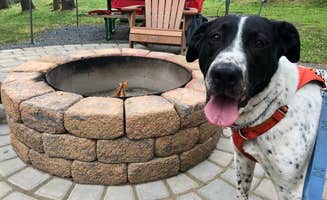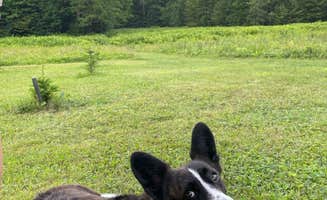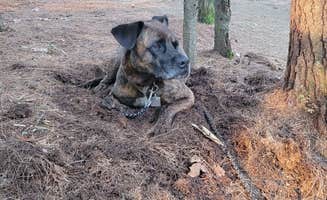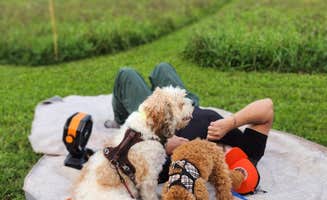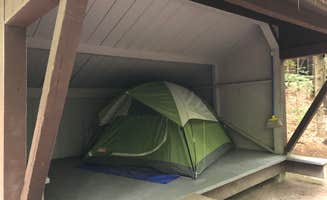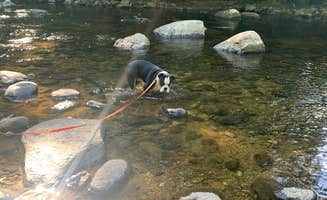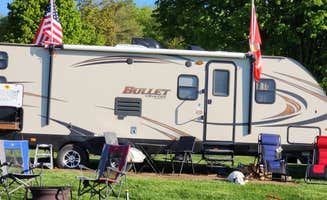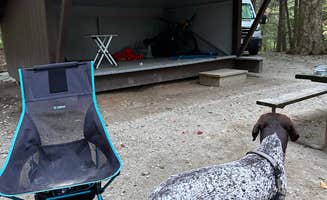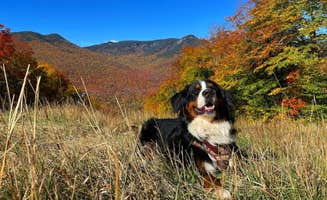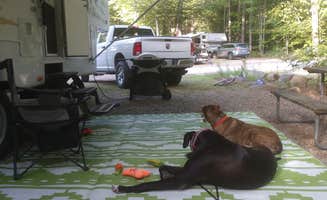Mount Ascutney State Park Campground is located in the Vermont hills approximately 20 miles from Etna, New Hampshire. The park sits at the base of a 3,200-foot monadnock mountain that stands alone rather than being part of the Green Mountains. Winter camping isn't available in most campgrounds in this region, with operating seasons typically running from mid-May through mid-October when temperatures range from 45-80°F.
What to do
Hiking with dogs: At Mount Ascutney State Park Campground, several trails accommodate pets. One camper noted, "There is a nice field for kids to play in, and clean washrooms. The campsites are all wooded. Some are private, while others are a little crowded together. The park is dog-friendly, which we always appreciate."
Riverside activities: Many campgrounds provide water access for dogs to cool off after hikes. At The Pastures Campground, campers appreciate the waterfront options. One reviewer stated, "Lots of room; nice pool and a playground; right on the Connecticut River." These riverside sites are ideal for dogs that enjoy swimming.
Mountain biking with pets: Some properties maintain trail networks accessible from campsites. A Mount Ascutney visitor mentioned, "The state park maintains its own mountain biking trail loop, accessible directly from the campground. It is a 3-mile beginner-friendly loop, with some nice rollers and moderate terrain." Many of these trails allow leashed pets, giving dogs and owners exercise options beyond the campground.
What campers like
Private, wooded sites: At Jacobs Brook Campground, campers appreciate the natural setting and spacing between sites. One reviewer mentioned, "Off the beaten path so its peaceful. Sites are a little small but great if you're camping with a group so you're close together. Plenty of sites/types to choose from." These private sites provide quieter environments for anxious pets.
Clean facilities: Many dog friendly campgrounds near Etna maintain high cleanliness standards. A camper at Rest N Nest Campground wrote, "Owners were very welcoming and helpful. The bathrooms were cleaner than mine at home. Nostalgic feel with playground, pool, and rec hall." Clean facilities are especially important when camping with pets.
Proximity to trails: Campers consistently highlight easy trail access from sites. One Mount Ascutney visitor shared, "We hiked the Weathersfield Trail (2.9 miles from trailhead to summit). It was a challenge, but well worth it. There were several lookout points with spectacular views." This accessibility makes pet exercise convenient during longer stays.
What you should know
Leash policies: Most campgrounds require pets to be leashed at all times when outside vehicles or camping units. Leash length restrictions typically limit to six feet, and retractable leashes are discouraged in many campgrounds due to control issues.
Breed restrictions: Some properties maintain breed restrictions or weight limits. Call ahead to confirm your dog meets requirements, particularly for less common breeds.
Quiet hours: At Moose Hillock Camping Resort, one camper noted a noise consideration: "Noise level isn't monitored by staff, so don't expect it quiet at quiet time." This is important for campers with dogs that may be sensitive to nighttime disturbances.
Seasonal closures: Most dog-accommodating campgrounds close for winter. A Quechee-Pine Valley KOA camper mentioned, "Open 5/22/2020 - 10/18/2020," which is typical for the region. Plan accordingly if visiting during shoulder seasons.
Tips for camping with families
Kid-friendly dog parks: Quechee-Pine Valley KOA offers designated pet areas where children can interact with their dogs. One camper reported, "This place was very clean and loaded with amenities: pool, dog park, events, open fields, deer, store, etc." The fenced areas provide safe spaces for dogs and children to play together.
Pet-accessible swimming: Several campgrounds offer water access appropriate for both children and dogs. A Pine Haven visitor mentioned, "This campground is a great place to bring a dog, especially if they enjoy running/playing in a river. The sites near the river are really nice, a bit of a steep slope down to the river. The river is about thigh deep and you can easily walk in it/swim at portions."
Ranger programs: Some parks offer educational programs where pets are welcome to join families. Look for outdoor sessions rather than indoor presentations, which typically prohibit pets. These programs often cover local wildlife and environmental topics, providing learning opportunities for all family members.
Tips from RVers
Full hookup considerations: When traveling with pets, water hookups become especially important for cleaning. At Storrs Pond Recreation Area, one RVer noted a layout challenge: "Only complaint is the site is set up 'backwards' - the electric hookups are on door side of RV and the picnic table/main area of site is on non-door side." This configuration may affect how you position water bowls and pet gear.
Site selection: For RVers with dogs, request sites away from common areas. A Jacobs Brook camper advised, "One nice thing about being part of the Dyrt community is discovering spots you'd never thought about exploring and this is one of those places. Jacobs brook is a small family-owned campground with about 50 wooded sites."
Waste disposal: Most campgrounds provide pet waste stations, but always verify locations upon check-in. Pack biodegradable bags and consider a portable waste container for temporary storage before reaching proper disposal points. This is particularly important at primitive sites or when boondocking outside of established facilities.


